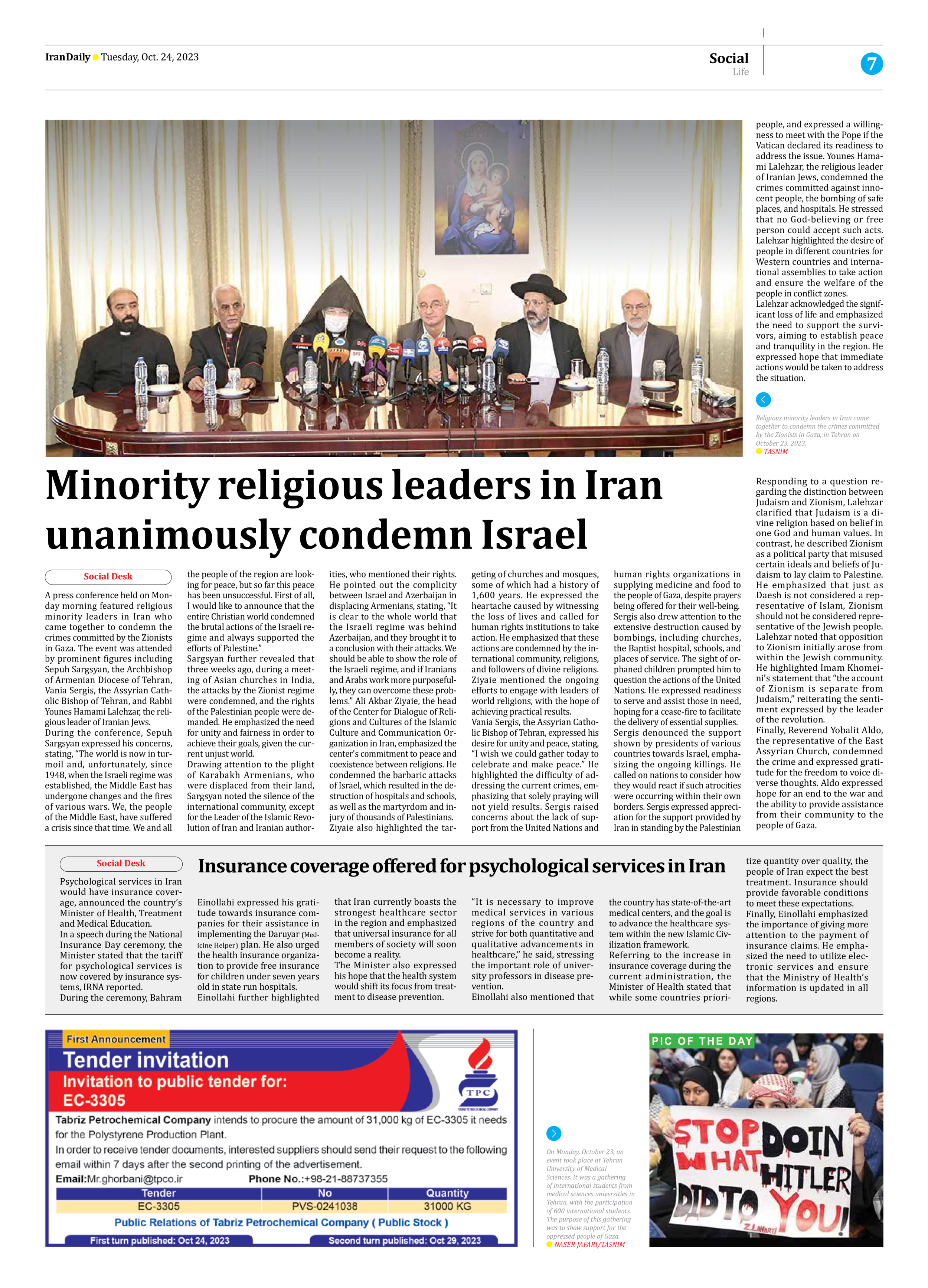
Minority religious leaders in Iran unanimously condemn Israel
A press conference held on Monday morning featured religious minority leaders in Iran who came together to condemn the crimes committed by the Zionists in Gaza. The event was attended by prominent figures including Sepuh Sargsyan, the Archbishop of Armenian Diocese of Tehran, Vania Sergis, the Assyrian Catholic Bishop of Tehran, and Rabbi Younes Hamami Lalehzar, the religious leader of Iranian Jews.
During the conference, Sepuh Sargsyan expressed his concerns, stating, “The world is now in turmoil and, unfortunately, since 1948, when the Israeli regime was established, the Middle East has undergone changes and the fires of various wars. We, the people of the Middle East, have suffered a crisis since that time. We and all the people of the region are looking for peace, but so far this peace has been unsuccessful. First of all, I would like to announce that the entire Christian world condemned the brutal actions of the Israeli regime and always supported the efforts of Palestine.”
Sargsyan further revealed that three weeks ago, during a meeting of Asian churches in India, the attacks by the Zionist regime were condemned, and the rights of the Palestinian people were demanded. He emphasized the need for unity and fairness in order to achieve their goals, given the current unjust world.
Drawing attention to the plight of Karabakh Armenians, who were displaced from their land, Sargsyan noted the silence of the international community, except for the Leader of the Islamic Revolution of Iran and Iranian authorities, who mentioned their rights. He pointed out the complicity between Israel and Azerbaijan in displacing Armenians, stating, “It is clear to the whole world that the Israeli regime was behind Azerbaijan, and they brought it to a conclusion with their attacks. We should be able to show the role of the Israeli regime, and if Iranians and Arabs work more purposefully, they can overcome these problems.” Ali Akbar Ziyaie, the head of the Center for Dialogue of Religions and Cultures of the Islamic Culture and Communication Organization in Iran, emphasized the center’s commitment to peace and coexistence between religions. He condemned the barbaric attacks of Israel, which resulted in the destruction of hospitals and schools, as well as the martyrdom and injury of thousands of Palestinians.
Ziyaie also highlighted the targeting of churches and mosques, some of which had a history of 1,600 years. He expressed the heartache caused by witnessing the loss of lives and called for human rights institutions to take action. He emphasized that these actions are condemned by the international community, religions, and followers of divine religions. Ziyaie mentioned the ongoing efforts to engage with leaders of world religions, with the hope of achieving practical results.
Vania Sergis, the Assyrian Catholic Bishop of Tehran, expressed his desire for unity and peace, stating, “I wish we could gather today to celebrate and make peace.” He highlighted the difficulty of addressing the current crimes, emphasizing that solely praying will not yield results. Sergis raised concerns about the lack of support from the United Nations and human rights organizations in supplying medicine and food to the people of Gaza, despite prayers being offered for their well-being.
Sergis also drew attention to the extensive destruction caused by bombings, including churches, the Baptist hospital, schools, and places of service. The sight of orphaned children prompted him to question the actions of the United Nations. He expressed readiness to serve and assist those in need, hoping for a cease-fire to facilitate the delivery of essential supplies.
Sergis denounced the support shown by presidents of various countries towards Israel, emphasizing the ongoing killings. He called on nations to consider how they would react if such atrocities were occurring within their own borders. Sergis expressed appreciation for the support provided by Iran in standing by the Palestinian people, and expressed a willingness to meet with the Pope if the Vatican declared its readiness to address the issue. Younes Hamami Lalehzar, the religious leader of Iranian Jews, condemned the crimes committed against innocent people, the bombing of safe places, and hospitals. He stressed that no God-believing or free person could accept such acts. Lalehzar highlighted the desire of people in different countries for Western countries and international assemblies to take action and ensure the welfare of the people in conflict zones.
Lalehzar acknowledged the significant loss of life and emphasized the need to support the survivors, aiming to establish peace and tranquility in the region. He expressed hope that immediate actions would be taken to address the situation.
Responding to a question regarding the distinction between Judaism and Zionism, Lalehzar clarified that Judaism is a divine religion based on belief in one God and human values. In contrast, he described Zionism as a political party that misused certain ideals and beliefs of Judaism to lay claim to Palestine. He emphasized that just as Daesh is not considered a representative of Islam, Zionism should not be considered representative of the Jewish people. Lalehzar noted that opposition to Zionism initially arose from within the Jewish community. He highlighted Imam Khomeini’s statement that “the account of Zionism is separate from Judaism,” reiterating the sentiment expressed by the leader of the revolution.
Finally, Reverend Yobalit Aldo, the representative of the East Assyrian Church, condemned the crime and expressed gratitude for the freedom to voice diverse thoughts. Aldo expressed hope for an end to the war and the ability to provide assistance from their community to the people of Gaza.







